Automotive Artificial Intelligence Market Research, 2032
The global automotive artificial intelligence market size was valued at $13.8 billion in 2022, and is projected to reach $405.3 billion by 2032, growing at a CAGR of 40.7% from 2023 to 2032.
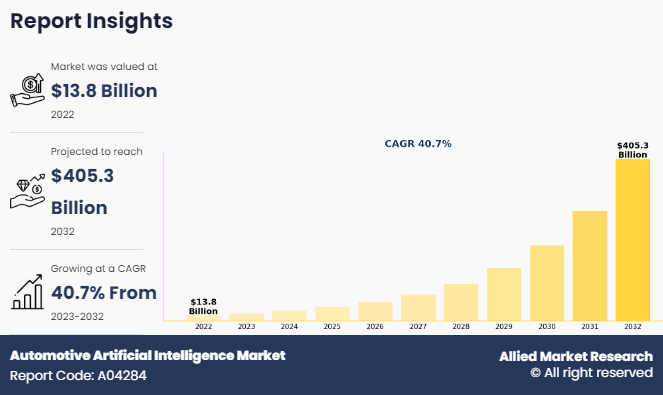
Report Key Highlighters:
- The automotive artificial intelligence market forecast covers 14 countries. The research includes regional and segment analysis of each country in terms of value ($billion) for the projected period 2023-2032.
- The study integrated high-quality data, professional opinions & analysis, and critical independent perspectives. The research approach is intended to provide a balanced view of global markets and to assist stakeholders in making educated decisions in order to achieve their most ambitious growth objectives.
- Over 3,700 product literature, annual reports, industry statements, and other comparable materials from major industry participants were reviewed to gain a better understanding of the market.
- The key players in the automotive artificial intelligence market share are Nvidia Corporation, Alphabet Inc., Intel Corporation, IBM, Microsoft Corporation, BMW AG, Uber Technologies, Inc., Tesla, Inc., Toyota Motor Corporation and AB Volvo. The companies have adopted strategies such as product launches, contracts, expansions, and agreements to improve their market positioning.
Automotive artificial intelligence refers to the implementation of AI technology in vehicles to increase several aspects of the automobile system, including efficiency, safety, convenience, and to improve the overall vehicle driving experience. The automotive industry has witnessed the potential of AI and is among the major industries utilizing AI technologies to augment and mimic human actions. Furthermore, with the emergence of modern automobile functions such as advanced driver assistance system (ADAS), adaptive cruise control (ACC), blind spot alert, autonomous driving, predictive maintenance, intelligent traffic management, and growth in demand for convenience features attract automotive manufacturers toward implementation of AI in automobiles.
The expansion of automotive artificial intelligence market is driven by increase in demand for autonomous vehicles, growth in high-speed internet & 5G technology, and rise in demand for enhanced user experience & convenient features. However, rise in security and privacy concerns and stringent regulatory landscape are anticipated to hinder the market growth. Furthermore, increase in demand for premium vehicles and growth in connected vehicle technology are anticipated to provide lucrative growth opportunity for the market during the forecast period.
In recent years, autonomous vehicles have gained popularity due to various features such as automatic parking, self-driving, autopilot, and others features. Autonomous vehicles minimize human effort while driving. Furthermore, global companies such as Nvidia Corporation, Intel Corporation, and Tesla, Inc., have been investing more in the development of autonomous vehicle technology in recent years.
For instance, on December 16, 2021, Intel Corporation, subsidiary of Mobileye Global Inc., announced they have acquired testing permit for their autonomous driving taxi in Paris. Mobileye Global Inc. collaborated with RATP Group, the world’s third largest public transportation operator company. The company is expected to use Mobile AV test vehicles, which transport two passengers at a time. The collaboration is expected to provide a crucial testing ground to create autonomous driving services that are secure, convenient, and can be implemented globally.
Similarly, Tesla, Inc. autopilot system has features such as keeping the vehicle within a lane while driving, auto changing the lanes whenever required and self-parking, which is one of the most advanced systems available in the market. Moreover, autonomous vehicles are anticipated to reduce human intervention and are of vital importance in industries that have a shortage of manpower especially in the transportation and logistics industry. This, in turn, is expected to drive the growth of the automotive artificial intelligence market.
Key Developments
The leading companies have adopted strategies such as acquisition, agreement, expansion, partnership, contracts, and product launch to strengthen their market position.
- On January 8, 2024, Nvidia Corporation announced its NVDIA DRIVE Thor platform, a centralized car computer platform for the next generation of automobiles. The new platform is integrated with a wide range of intelligent functions in a single AI computer platform and offers AI cockpit functionality, driver & passenger monitoring, and autonomous driving and parking capabilities. The new platform is used by major EV manufacturers, including Great Wall Motor, Zeekr, Xiaomi EV, and others.
- On January 24, 2024, Alphabet Inc. announced an update for its Android Auto system. The new update is expected to include AI features with the aim of reducing screen time while driving and is projected to majorly focus on reducing driver distraction. The new update is anticipated to include a voice recognition system, and the majority of the system is controlled via voice recognition. The system also navigates to shared locations with a single tap, without having to manually enter that location into Google Maps.
- On January 9, 2024, Intel Corporation announced they are working on developing the latest AI-enabled chips, especially for the automobile industry. The company is also looking toward acquisition of Silicon Mobility SAS, specializing in software and system-on-a-chip technologies for Electric Vehicle motors and onboard charging systems.
- On February 16, 2022, Nvidia Corporation announced its strategic partnership with Jaguar Land Rover, to develop and deliver the next generation of automated driving systems as well as AI-enabled services and experiences. According to the agreement, all vehicles from 2025 are expected to be built on NVIDIA DRIVE software platform, a centralized platform for safety, security and networking systems. The new system is expected to deliver automated driving & parking systems, driving assistance, and driver & occupant monitoring, as well as advanced visualization of the vehicle’s environment.
Segmental Analysis
The automotive artificial intelligence market is segmented on the basis of component, technology, application, and region. By component, the global market is divided into hardware, software, and services. On the basis of technology, the automotive artificial intelligence industry has been segregated into machine learning & deep learning, computer vision, natural language processing, and others. On the basis of application, the market is classified into semi-autonomous and autonomous. By region, the market is analyzed across North America, Europe, Asia-Pacific and Latin America and Middle East and Africa.
By Component
On the basis of component, the automobile artificial intelligence market has been segregated into hardware, software, and services. The hardware segment accounted for the largest market share in 2022. The hardware segment is one of the most crucial for the automotive artificial intelligence industry, and it is the basic requirement to implement artificial intelligence technology in automobiles. However, the software segment is anticipated to witness the strongest growth rate due to increasing use of AI powered software in various applications of automobile such as speech recognition, image recognition, data analysis, and motion detection.
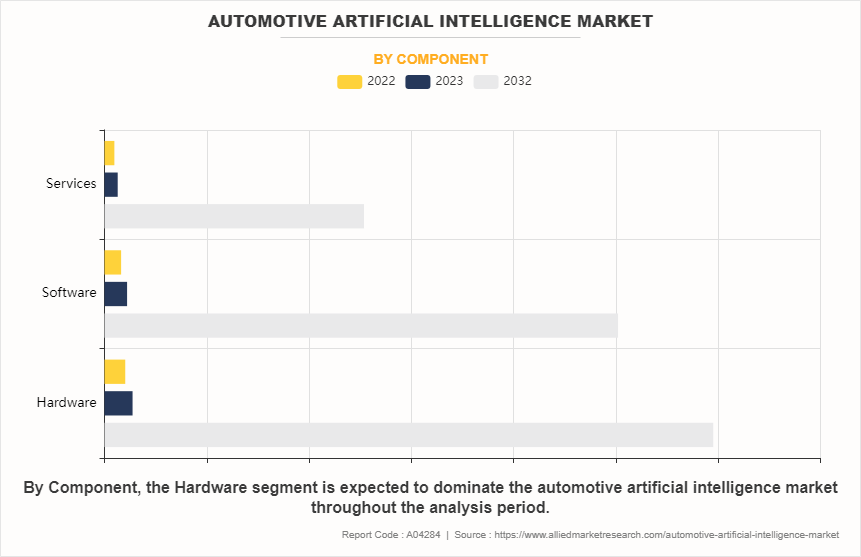
By Technology
By technology, the automobile AI market is classified into machine learning & deep learning, computer vision, natural language processing, and others. The machine learning & deep learning segment accounted for the largest market share in 2022, owing to the increased use of machine learning and deep learning in the development of autonomous vehicles; this technology is used to discover relevant patterns in data and further analyze and make decisions and predictions. However, the natural language processing segment is anticipated to witness the highest growth rate due to increased use of this technology in extracting meanings and generating human-readable text from the data moreover, there has been increasing use of the technology in voice and speech recognition to convert data in human-readable formats.
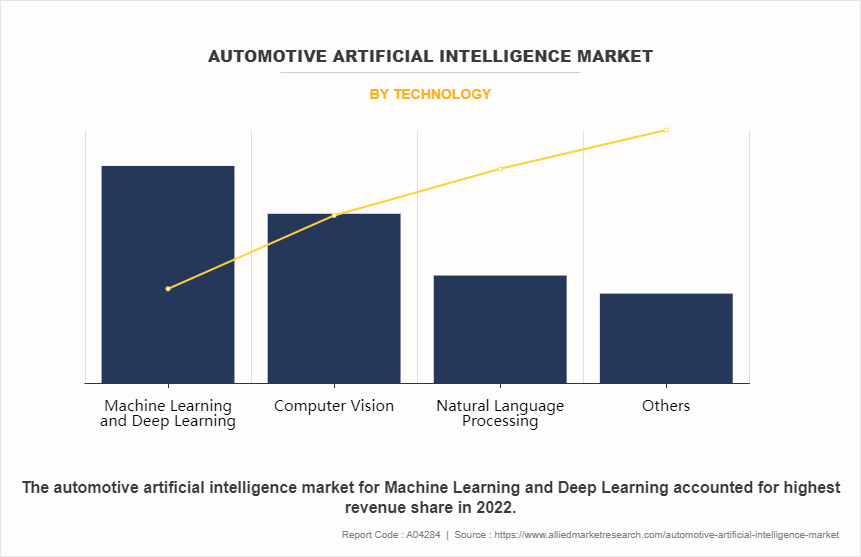
By Application
On the basis of the application, the automotive AI market has been bifurcated into semi-autonomous and autonomous segments. The semi-autonomous segment accounted for the largest market share in 2022 due to cost-effective nature of semi-autonomous vehicles, making them a more affordable option for manufacturers and consumers. However, the autonomous segment is anticipated to register the highest growth rate due to an increase in technological advancement and rise in R&D initiatives for the development of autonomous vehicle technology. In addition, autonomous vehicles reduce the potential of human error and make them safer and more efficient.
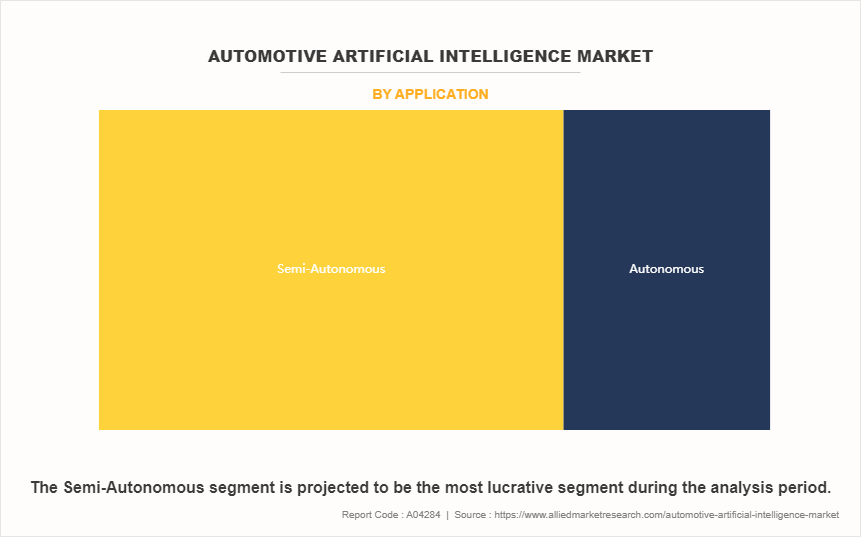
By Region
On the basis of region, the automotive artificial intelligence market growth has been analyzed across North America, Europe, Asia-Pacific, Latin America and Middle East and Africa. North America accounted for the largest market share in 2022, owing to increase in presence of AI system developers in the region. Furthermore, the region has witnessed an increase in demand for artificial intelligence in automobiles, surge in the level of vehicle automation, availability of high-end infrastructure, and the emergence of Internet of Things (IoT) technology. The North American region has witnessed a rise in investments by automobile manufacturers and government initiatives toward promotion and the development of automotive artificial intelligence technology. However, the Asia-Pacific region is anticipated to witness the fastest growth rate during the forecast period, owing to the rise in the adoption of artificial intelligence solutions by major automobile manufacturers. Furthermore, there is an increasing inclination of automakers towards self-driving vehicles, lower fuel emissions, and minimizing the chances of road fatalities, which are expected to enhance the market growth potential.
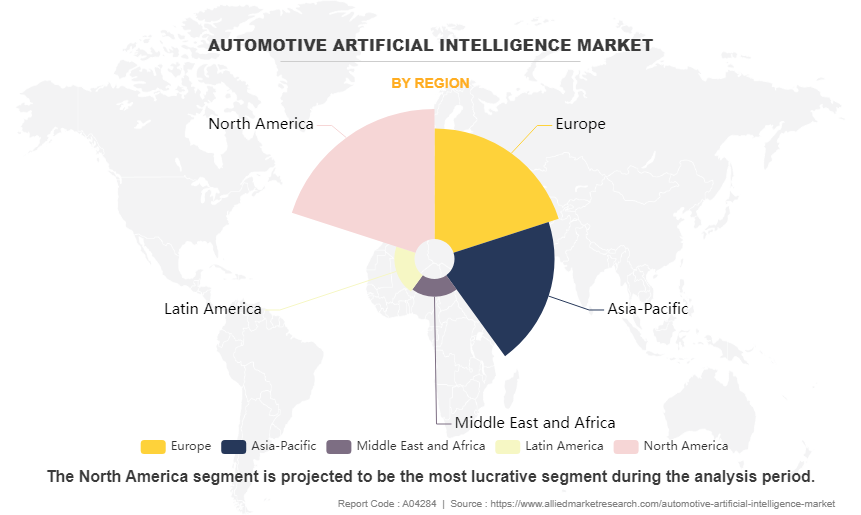
Market Dynamics
Growth in High-Speed Internet and 5G Technology
Automotive artificial intelligence relies on high-speed internet service for real-time information sharing related to driver alertness, traffic conditions, weather conditions, and others. The development in high-speed internet and communication technologies are anticipated to be a major driving factor for the growth of artificial intelligence in the automobile market.
For instance, according to statistics from Invest India, a National Investment Promotion and Facilitation Agency of India, set up by the Government of India and the Ministry of Commerce and Industry, outlines that India's telecom industry is the second largest in the world and as of September 2022, the internet subscriber base in the county accounted for 1.17 billion users. The growth of telecom industry in the country saw exponential growth in recent years due to rollout of 3G, 4G networks, affordable tariffs, and supportive government initiatives. Moreover, in 2022, the government announced the auction of IMT/5G spectrum, which is further expected to boost the telecom industry in the country. Many other countries, especially in developing regions of southeast Asia, Latin America, and the Middle East region, promote high-speed internet and the telecom industry. Thus, the penetration of high-speed internet is expected to be the crucial driving factor for the automotive artificial intelligence market size.
Stringent Regulatory Landscape
Government agencies look after the use of artificial intelligence technology in automobiles, such as the National Highway Traffic Safety Administration (NHTSA) and the European Union Agency for Cybersecurity (EUAC). Moreover, there has been a growth in regulatory challenges toward the use of AI in automobiles due to ethical and safety concerns.
For instance, in June 2023, NHTSA issued guidelines to assess whether manufacturers of prototype vehicles and equipment manufacturers, are fulfilling legal requirements to ensure that their products meet the regulatory standards which can otherwise results in the safety of motor vehicles and passengers. The amendment looks after examining the decisions made by software algorithms that analyze data inputs in real-time to determine the appropriate vehicle response and movement.
Key Benefits For Stakeholders
- This report provides a quantitative analysis of the market segments, current trends, estimations, and dynamics of the automotive artificial intelligence market analysis from 2022 to 2032 to identify the prevailing automotive AI market opportunities.
- The market research is offered along with information related to key drivers, restraints, and opportunities.
- Porter's five forces analysis highlights the potency of buyers and suppliers to enable stakeholders make profit-oriented business decisions and strengthen their supplier-buyer network.
- In-depth analysis of the market segmentation assists to determine the prevailing market opportunities.
- Major countries in each region are mapped according to their revenue contribution to the global market.
- Market player positioning facilitates benchmarking and provides a clear understanding of the present position of the market players.
- The report includes the analysis of the regional as well as global automotive artificial intelligence market trends, key players, market segments, application areas, and market growth strategies.
Automotive Artificial Intelligence Market Report Highlights
| Aspects | Details |
| Market Size By 2032 | USD 405.3 billion |
| Growth Rate | CAGR of 40.7% |
| Forecast period | 2022 - 2032 |
| Report Pages | 233 |
| By Component |
|
| By Technology |
|
| By Application |
|
| By Region |
|
| Key Market Players | Nvidia Corporation, Tesla, Inc., Uber Technologies, Inc, Intel Corporation, Alphabet Inc, Toyota Motor Corporation, BMW AG, AB Volvo, Microsoft Corporation, IBM |
Analyst Review
AI involves the science and engineering of intelligent computer programs. It uses various computer functions such reasoning, learning, and problem-solving based on human intelligence. AI systems are used in various disciplines such as biology, computer science, mathematics, linguistics, psychology, and engineering to build an intelligent system. Applications that incorporate the AI systems in automotive are semi-autonomous and autonomous.
By component, hardware segment was the dominant segment in 2017, and is anticipated to continue this trend during the forecast period. In addition, by technology, machine learning & deep learning, was the dominant segment in 2017. By application, the autonomous segment is anticipated to witness the highest growth rate during the forecast period.
North America accounted for the majority market share of the automotive artificial intelligence market in 2017, owing to rise in demand for autonomous vehicles.
Autonomous and self driving technology are the upcoming trends in the automotive artificial intelligence market industry.
Semi-autonomous vehicles are the leading application of the automotive artificial intelligence market.
North America is the largest region for the automotive artificial intelligence market.
The automotive artificial intelligence market was valued at $13.82 billion in 2022, and is estimated to reach $405.28 billion by 2023.
Nvidia Corporation, Alphabet Inc., Microsoft Corporation, and Intel Corporation are some of the major companies operating in the automotive artificial intelligence market.
Loading Table Of Content...
Loading Research Methodology...


